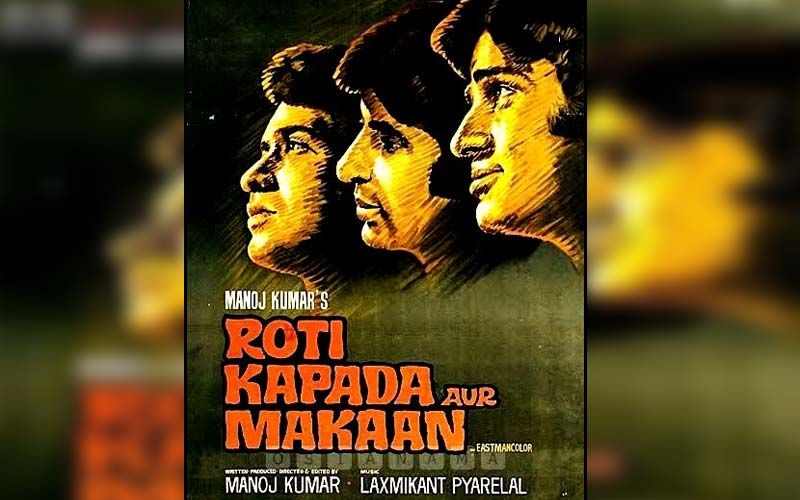Revisiting Manoj Kumar's Roti Kapada Aur Makaan On His 84th Birthday
As Manoj Kumar turns 84 today here's revisiting his classic and the most popular Roti Kapada Aur Makaan

Today when Manoj Kumar is in semi-retirement it is easy to overlook his monumental contribution to commercial Hindi cinema. From the time he turned director officially with Upkar in 1967(he had earlier ghost-directed the patriotic Shaheed) Manoj Kumar emblazoned the silver screen with star-studded epic-sized mega-musicals. Purab Aur Paschim in 1970, Shor in 1972 were followed by Roti Kapada Aur Makaan (RKAM) in 1974. A star-spangled melodrama about love, betrayal, and unemployment RKAM saw Manoj return to the role of the Every-man Bharat, the conscience of the nation pricked by the growing corruption in our society and by the inability of the common man to cope with the pressures of compromised living.
While Upkar was inspired by Lal Bahadur Shastri’s slogan Jai jawan Jai Kisan RKAM found its inspiration in Indira Gandhi’s Garabi hatao slogan. Hence in a sequence simmering with indignant drama Manoj Kumar, playing Bharat, burnt his university degree in his father’s funeral pyre. The pronounced political undercurrents of the drama notwithstanding, RKAM is at heart a love triangle where the jobless hero Bharat(Manoj Kumar) is ditched by his ambitious girlfriend Sheetal(Zeenat Aman) who chooses to marry the rich industrialist Mohan Babu(Shashi Kapoor) instead. The narration steeped in symbolism made outstanding use of Laxmikant-Pyarelal’s music especially Main na bhoolunga which recurs with ironic reverberations to remind the guilt-stricken gold-digger of a heroine of her betrayal.
Although Manoj Kumar denies it, the love triangle in RKAM is strongly reminiscent of Guru Dutt’s Pyasa where the poet was abandoned by his fiancée for a rich catch. The prostitute Gulabo(Waheeda Rehman) smoothened the sensitive poet’s, wounded heart. In RKAM it’s the pure-hearted Tulsi(Moushumi Chatterjee) who provides hope for Bharat’s shattered heart. 38 years after it was released RKAM continues to exude the scent of topicality. The issue of unemployment continues to haunt our social infrastructure. Manoj Kumar laced his sloganeering theme with devilish dollops of entertainment. Zeenat Aman bursting into her bottom-wriggling Hai hai yeh majboori in Lata Mangeshkar’s seductive voice remains a central attraction, as does the anti-inflation anthem Mehngai maar gayi. The mix of socio-cultural concerns with a spectral melodramatic plot never defeated the narration’s purpose of keeping audiences involved till the dying moments of the movie where Zeenat’s Sheetal must give up her life to redeem herself.
Vastly underrated at the time of its release what comes across to this day is the writer-director-actor’s genuine concern for the collapse of the Great Indian Dream His cinema invariably lamented the disillusionment of Indians after the Partition. From the farmer in Upkar to the working-class father in Shor Manoj Kumar epitomized the dissolution of the Nehruvian dream. In RKAM Kumar instilled ruggedness and virility into the storytelling. Whether in showing Bharat’s sibling Vijay(Amitabh Bachchan)’s repressed anger at social injustice erupting into a decisive confrontation with his brother Bharat, or in the way the hapless Tulsi(Moushumi) is raped in a grocer’s backroom swathed in flour(a sequence that was roundly condemned as being voyeuristic and titillating at the time of release), Manoj Kumar’s creative aggression manifests itself in passionate images of drama and redemption played at an incredibly high decibel.
Manoj Kumar had a penchant for increasing the volume of drama without letting his characters topple over with the sheer weight imposed on the plot. There are vividly etched cameos by one and all. Premnath who had earlier immortalized himself as the altruistic Khan Badshah in Manoj Kumar’s Shor returned to RKAM as the sword-wielding Sardar Harnam Singh. Amidst this rush hour of high-maintenance characters, it’s easy to overlook the amazing Aruna Irani as a wry self-deprecating mistress of a sleazy businessman. Aruna’s Panditji mere marne ke baad bas itna kasht utha lena mere mooh mein gangaajal ki jegah thodi madira tapkda dene defines the marginal people in Manoj Kumar’s cinema who have no choice but to laugh at what destiny has chosen to do with their lives.
When Zeenat’s character Sheetal resolves to marry money Manoj goes on television to sing Aur nahin bas aur nahin gham ke pyale aur nahin…The moment is so rich in ricocheting anguish it jumps out of the screen and owns you. Wrongly RKAM has been interpreted as a potboiler. Yes, it brings together ‘ingredients’ from formalistic cinema in one line of vision. The pyramid of drama and conflict in the plot is constructed with meticulous care. The commodious material is edited (by Manoj Kumar) leaving no room for superfluous moments.In this remarkable filmmaker’s opulent oeuvre RKAM stands tall for its determined stand on ‘burning issues’. The characters especially those played by Amitabh Bachchan and Moushumi Chatterjee represent the growing cynicism of young India towards corrupt politics and politicians which thwart middle-class aspirations. And yet the film’s tone never gets cynical. Even when Bharat in sheer frustration throws his graduation degree into the funeral pyre we know he will find his out of the deadlock. That’s the magic of cinema. We can hope and dream through suffering. Manoj Kumar Speaks On Roti Kapada Aur Makaan:
“When I was in Class 8 a senior student named Dewan at a school function chanted, ‘Maang raha hai Hindustan roti kapada aur makaan. That’s where the idea came to me. Roti Kapada Aur Makaan remains contemporary. The film was inspired by a report in a newspaper in 1972. A young graduate tore up his degree in front of the vice-chancellor as soon as it was given to him. That set me thinking about degrees and jobs. At the time when I made the film, it was considered a multi-starrer with Shashi Kapoor, Zeenat Aman, Moushumi Chatterjee, and Amitabh Bachchan. But I don’t sign stars. I sign actors. Amit was not a star when I signed him. I met him on the sets of my film Sajan where he was screen-tested. His family was known to me. I was the first filmmaker to offer him a role while he was still working in Kolkata in a private company. When I was shooting for three of my films Purab Aur Paschim, Yaadgaar, and Pehchan he arrived in Mumbai. He signed some films but was replaced. I remember telling him at RajKamal studios not to return to Kolkata because I had a very special role for him. That’s how Roti Kapada Aur Makaan happened in Amit’s career. Zeenat Aman’s role was offered to Sharmila Tagore. In fact Shor was a byproduct of Roti Kapada Aur Makaan. I was not meant to make Shor. But my company’s PRO Gopal Pandey narrated some of Moushumi Chatterjee’s scenes in Roti Kapada Aur Makaan to Sharmila, She insisted she’d play Moushumi’s rather than Zeenat’s role. Because of Sharmila’s refusal to do Roti Kapada Aur Makaan I did Shor first. I was lying down on my charpoy on my farm in Delhi when the idea for Shor came to me. Moushumi’s role. I had seen her in Tarun Mazumdar’s Bengali film Balika Badhu in Kolkata. She symbolized the rape of the common woman. As for the music the credit goes to Laxmikant and his partner Pyarelal. During composition, my first priority is good lyrics. The songs must take the story ahead. I give the situation to my composers to compose musically. I was in Hardwar with my children once when I heard Hai hai yeh majboori early morning at 4 am on the loudspeaker. I found that funny. Yes, Zeenat danced and I just watched. The irony of the situation was Bharat couldn’t join her in the rain because he had to go for a job interview. Also, after Upkar and Purab Aur Paschim where I played a patriotic idealist how could I be shown getting intimate with the heroine? In the culture that I come from men didn’t touch women before marriage. Trust me it was very hard for me to not touch my heroine and still create romance. It used to be a nightmare. In Purab Aur Paschim Saira Banu played a half-British girl. Wohto seedha pakad kar chummi le leti. It took all my willpower to protect the sanctity of my hero Bharat.”
Image source: CharanjitKalirai/Sureyya/IMDb


